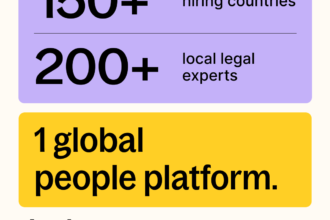The rise of remote work has transformed the global employment landscape. Businesses are no longer restricted by geographical boundaries when hiring talent, and employees have greater flexibility in choosing where and how they work. This shift is not just a temporary trend but a fundamental change in the way companies operate. In this blog, we’ll explore how remote work is reshaping global employment, the challenges it presents, and how businesses can adapt to this new reality.
How Remote Work is Changing Global Employment
1. Access to a Global Talent Pool
Companies can now hire skilled professionals from anywhere in the world, enabling them to tap into diverse talent without the limitations of location. This allows businesses to find the best candidates while also reducing labor costs by hiring in lower-cost regions.
2. Growth of Distributed Teams
Traditional office structures are being replaced by remote and hybrid teams working across multiple time zones. This enables companies to provide 24/7 support, collaborate with international talent, and expand into new markets more efficiently.
3. Rise of Employer of Record (EOR) Services
With companies hiring across borders, EOR services have become essential for managing international payroll, taxes, and compliance. An EOR helps businesses legally employ workers in different countries without setting up local entities.
4. Shift in Work Culture and Employee Expectations
Employees now expect flexibility, work-life balance, and remote-friendly policies. Companies that embrace remote work attract top talent and improve employee retention rates.
5. Increasing Demand for Digital Collaboration Tools
With remote teams, businesses rely on project management tools, video conferencing, and cloud-based solutions to maintain seamless communication and productivity.
Challenges of Remote Work and How to Overcome Them
1. Compliance and Payroll Management
Different countries have unique labor laws, tax regulations, and payroll requirements. Companies must ensure compliance by working with global payroll providers or EOR services.
2. Cybersecurity and Data Protection
With employees accessing company data remotely, businesses must implement strong cybersecurity measures, such as VPNs, multi-factor authentication, and encrypted communication tools.
3. Maintaining Company Culture and Employee Engagement
Building a strong company culture remotely requires intentional efforts, including virtual team-building activities, clear communication, and employee recognition programs.
4. Time Zone Coordination and Productivity Management
Managing teams across different time zones can be challenging. Companies should establish clear working hours, use asynchronous communication tools, and encourage flexibility to improve collaboration.
How Businesses Can Adapt to the Future of Work
- Adopt a Remote-First Mindset: Design policies and workflows that support remote and hybrid work environments.
- Invest in Digital Infrastructure: Use cloud-based collaboration tools, cybersecurity solutions, and automated HR software for seamless operations.
- Work with an EOR for Global Hiring: Partnering with an EOR simplifies compliance, payroll, and employee management across multiple countries.
- Prioritize Employee Well-Being: Support mental health initiatives, encourage work-life balance, and offer remote work benefits to retain top talent.
Conclusion
Remote work is here to stay, and businesses that adapt to this shift will have a competitive advantage in the global market. By embracing technology, ensuring compliance, and creating a remote-friendly work culture, companies can attract top talent, expand internationally, and thrive in the future of work.







